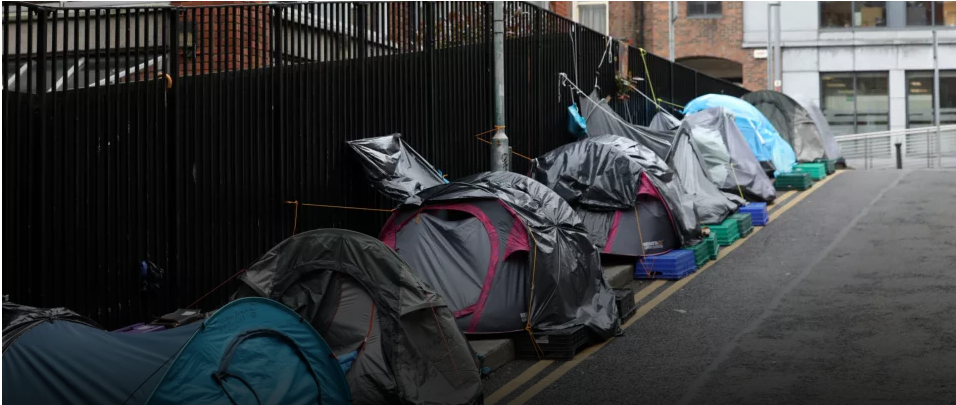The Growing Crisis: Homelessness and Horn of African Refugees in Dublin, Especially for Non-English Speakers—Author Horn of Africa Communities Network of Ireland (HACNI)

The Growing Crisis: Homelessness and Horn of African Refugees in Dublin, Especially for Non-English Speakers—Author Horn of Africa Communities Network of Ireland (HACNI)
The refugee and immigrant communities from the Horn of Africa, particularly Somalis, are facing an escalating housing crisis in Ireland. Since 2022, the situation has worsened considerably, with many families—especially women and children—falling into homelessness. This has left vulnerable populations without shelter and has triggered a wave of mental health challenges as they struggle to survive without stable accommodation.
As highlighted by the Horn of Africa Communities Network of Ireland (HACNI) Chairperson, Abdi aziz in a recent interview with Somali Radio in Ireland, the lives of many African immigrants in Ireland have reached a critical point. “Homelessness has skyrocketed in Dublin and across the country,” he said. The influx of economic immigrants from the Horn of Africa, compounded by Ireland’s overall housing shortage, has created a crisis of unprecedented scale, with Somali refugees and recent immigrants bearing the brunt of it.
1. The Plight of Women and Children
The housing crisis has disproportionately affected women and children within the Somali and broader Horn of Africa communities. Many of these individuals find themselves in precarious situations, sometimes Men singles sleeping on the streets or women temporarily boarding with other families, unable to secure safe, stable accommodation. Vulnerable families are often forced to rely on makeshift arrangements, which heightens their stress and insecurity, contributing to mental health issues like anxiety and depression.
In Dublin, it is not uncommon to find Somali women and children moving from one family’s home to another, as they have no permanent place to stay. “Their situation is becoming worse by the day,” said the HACNI Chairperson. “We are seeing more families, especially children, who are without homes. It’s heartbreaking.”
Ireland has experienced an increase in the number of refugees and economic immigrants from the Horn of Africa, particularly from Somalia, seeking better opportunities. However, this influx has come at a time when Ireland’s housing crisis is already at a critical juncture. The shortage of affordable housing and the growing demand for accommodation have left many new arrivals struggling to find a place to live.
This has left many Somalis in limbo, struggling to navigate Ireland’s complex housing system, often without adequate language skills or understanding of their rights. The lack of affordable housing options has made it increasingly difficult for immigrant families to secure long-term accommodation, leaving them exposed to the harsh realities of homelessness.
Mental Health and Vulnerability
The lack of secure housing, combined with the stress of living in limbo, has had a profound impact on the mental health of Somali refugees and immigrants in Ireland. Homelessness can exacerbate feelings of helplessness, isolation, and fear, particularly for women and children who may have already experienced trauma from their journeys to Europe. These individuals are often forced to live in overcrowded or unsafe conditions, further straining their mental and physical health.
The Horn of Africa Communities Network of Ireland (HACNI) is calling on the Irish government, local businesses, NGOs, and civil society to step up and provide urgent support to these vulnerable communities. “We are asking for more shelters, housing programs, and mental health services tailored to the specific needs of these refugees and immigrants,” said Sharif Mohamed. “Our community cannot endure this crisis alone.”
Call for Action: Supporting the Vulnerable
The humanitarian situation demands a coordinated effort from all sectors of society. NGOs, local businesses, and government agencies need to collaborate to provide temporary accommodation, shelters, and affordable housing solutions for Somali refugees and immigrants. In particular, women and children, who are often the most vulnerable, need immediate intervention.
There is also a need for culturally sensitive mental health services that address the trauma and stress experienced by those who have been displaced. Somali and other Horn of Africa immigrants need access to these services to rebuild their lives and regain their sense of security and dignity.
. Government and Community Efforts
While the Irish government has made efforts to address homelessness, the scale of the crisis requires even more proactive measures. Policies aimed at improving housing availability, increasing the number of emergency shelters, and providing social housing to immigrants are crucial to preventing further deterioration of the situation. The community is also urging business leaders to contribute by offering financial assistance, job opportunities, and other forms of support to help those affected.
The Horn of Africa Communities Network of Ireland (HACNI) has been working tirelessly to provide assistance and raise awareness about the growing homelessness crisis, but they need more help. Local community leaders are appealing for an immediate government response, as well as sustained support from the private sector and international organizations.
Conclusion
The homelessness crisis affecting Somali and Horn of Africa refugees in Ireland is not just a housing issue—it is a humanitarian emergency. Without immediate intervention, the situation will continue to worsen, leaving the most vulnerable—women, children, and those without economic means—on the streets or in temporary shelters.
Addressing this crisis requires a united effort from the Irish government, NGOs, businesses, and community organizations. It is time for a compassionate and urgent response to ensure that these families are not left behind. Only by working together can we secure a future where Somali refugees and immigrants in Ireland have the opportunity to rebuild their lives with dignity, stability, and hope.


